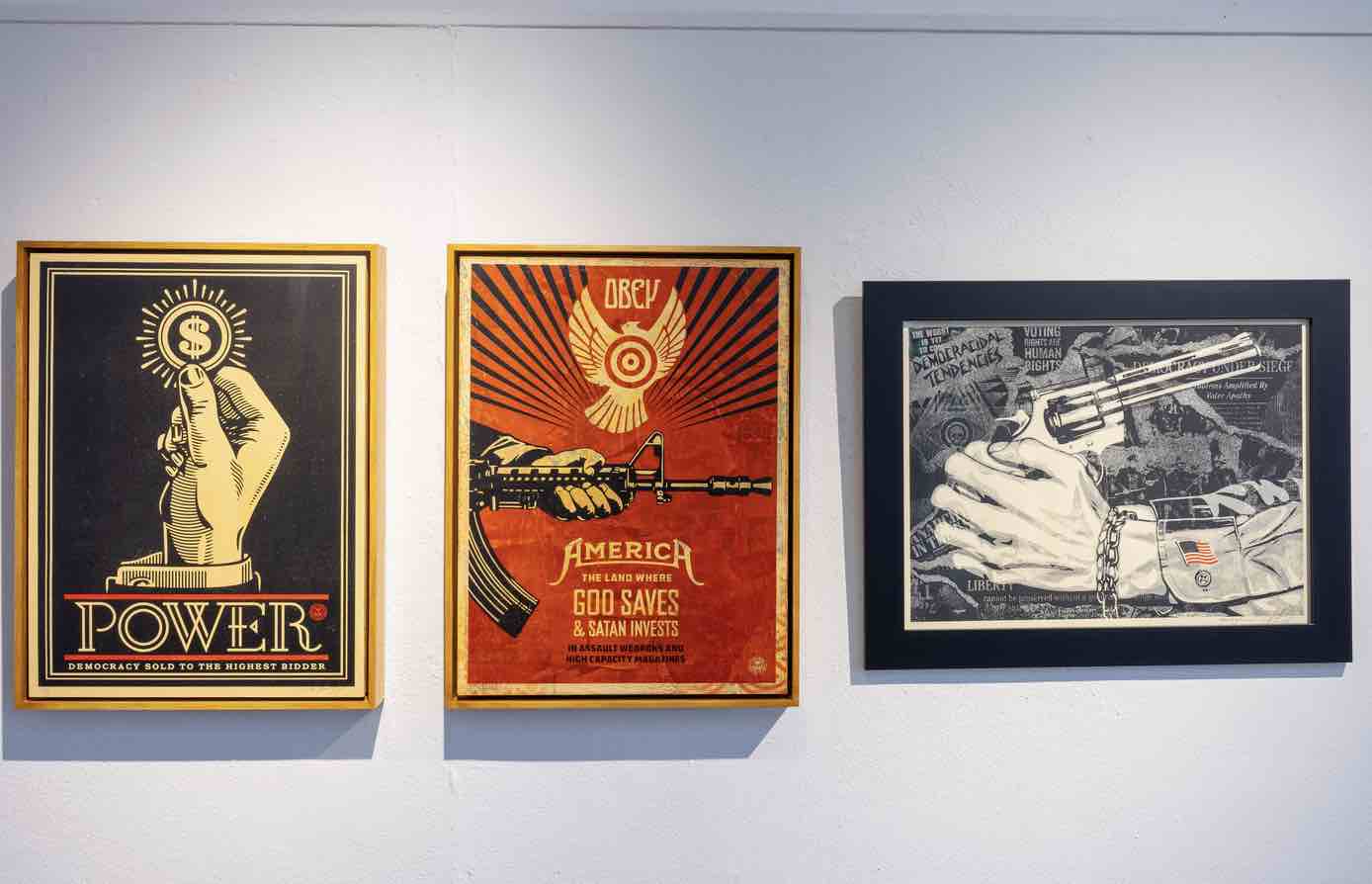Absolute Immunity: Emmanuel Art Gallery's Provocative Exhibition Confronts Power, Politics, and Justice
Alice Crogan | College of Arts & Media Aug 20, 2024
Absolute Immunity, open to the public at CU Denver’s Emmanuel Art Gallery on August 19th, explores power struggles and the unseen forces that reinforce social and political inequities. As the election cycle fervor brings poignancy to the exhibition, this timely exhibition challenges societal norms and advocates for change.
Featuring the work of Gregg Deal, Ramiro Smith Estrada, Shepard Fairey, Micol Hebron, Gaby Ōshiro, and Kenzie Sitterud, Absolute Immunity underscores the dangers of a society that allows the powerful absolution, because they control power. The graphic collages, paintings, sculptures, and AI generated images serve as a lens, urging us to reflect on our actions, the reasons behind them, and how we interact with power structures.
Artist Shepard Fairey, Creator of Barack Obama HOPE Poster Brings Collection of Work to the Emmanuel Art Gallery
Shepard Fairey is well-known for the iconic "HOPE" poster he created during Barack Obama's 2008 presidential bid, which became one of the most recognizable campaign posters in U.S. history. Fairey is also known for his “We The People” campaign that first appeared during the 2017 Women’s Marches around the world. With over 135 public murals to his name, Fairey has become one of the most influential and provocative artists of our time, bringing art activism mainstream and reshaping perceptions of the urban landscape. His work is known to explore both political activism and propaganda. Fairey’s large format collages on display at the Emmanuel Art Gallery are inspired by the contrast of war and peace, God and Satan, and values and action.
Using AI to Uncover the Dubious Reflections of Human-Generated Content
The two series of work Infantry and Summer Bod: Trad Wife Edition, by interdisciplinary artist Micol Hebron, critically examine the unsettling outcomes of text-to-image algorithms when prompted with seemingly simple instructions. The AI-generated images, depicting gun-toting children and bikini-clad "trad wives," raise profound questions about the nature of human-generated content on the internet. By highlighting these representations, the collection reveals the biases inherent in AI and reflects on the pervasive presence of violence and the objectification of women in online spaces. The work challenges viewers to consider how these images, as products of algorithmic aggregation, mirror the darker aspects of society and human behavior.
Two Argentinian Artists Explore Power, Memory, and Loss in Absolute Immunity, Running Through Hispanic Heritage Month
The Emmanuel Art Gallery is featuring the work of two Argentinian artists in Absolute Immunity, exploring systems of political and social power. Ramiro Smith Estrada is based in Buenos Aires and was in residence at CU Denver in August, visited CU Denver Visual Arts classes and hosted workshops for students. Estrada's work delves into the political and economic landscape of Argentina through life-like portraits filled with wry and witty symbolism. Gaby Ōshiro, based in Colorado Springs, was born in Argentina to a Japanese father and Italian mother. Her father worked for the Japanese Consulate and was "disappeared" during Argentina's Dirty War when she was a child in the 1980s. Ōshiro's art reveals the tragedy and extreme loss that can happen when people blindly follow corrupt leaders and governments. On October 9th, Ōshiro will lead a workshop at the Emmanuel Art Gallery with students to create an installation about memory, relationships, and remembrance.
Art Reflects a Society's Obsession: Guns as Symbols of Power and Control in Absolute Immunity
The pervasive images of guns featured in the Absolute Immunity exhibition serve as a stark reflection of a society deeply entrenched in gun culture. These artworks confront viewers with the unsettling reality that firearms have become an omnipresent symbol of power, control, and violence in modern life. Gregg Deal’s artworks challenge the notions of manifest destiny from the lens of his Native identity (Pyramid Lake Paiute Tribe). Guns tipped the balance of power in westward expansion, displacing indigenous people and allowing the most violent period in American history.
Deal also creates as an artist and father, and states “Our collective ineptitude to protect our children from firearms...in the end we are the laughingstock of the rest of the world as a country that is gun obsessed with a willingness to let American children die, based on an amendment created on December 15, 1791.”
Kenzie Sitterud creates large-scale installations to dissect public space and reveal structures of power. Their work is infused with humor that helps soften the blow of the difficult subject matter they often confront. The War Drum hangs from the cupola tower of the Emmanuel Art Gallery, like a massive child's mobile. Instead of animals or chimes, the hanging sculpture is made from chains, bells, and guns. The rifles have been professionally dismantled and deactivated by a nonprofit organization that permanently disables firearms, RAWtools.
Taken apart from their metal barrels and triggers, the wooden components become sculptural decoration. A disc of ice melts, slowly dripping onto a drum that amplifies the sound like steady bullets through an attached loudspeaker. For Sitterud, this sculpture is a symbol of their upbringing in a rural and strictly religious community. As a queer artist, they often felt excluded and had to examine "the dysphoric environment experienced by the queer community within a societal framework not designed for their inclusion." Sometimes when communities exclude others because they are different, violence can be the result, either physical or emotional.
Absolute Immunity at the Emmanuel Art Gallery
August 19–November 2, 2024
Opening Reception August 29, 4–7 PM
Emmanuel Art Gallery
1205 10th Street Plaza
Denver, CO
Located on the Auraria Campus (google maps).
This exhibition is generously sponsored by CU Denver’s College of Arts & Media, with additional support from RedLine Contemporary Art Center.